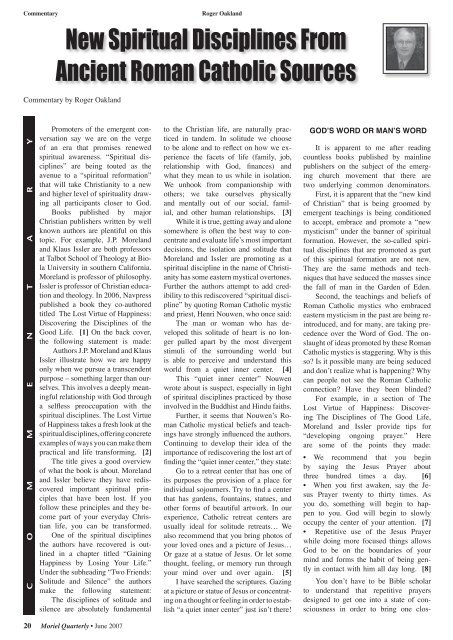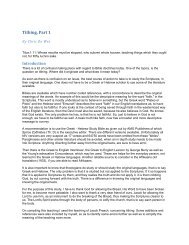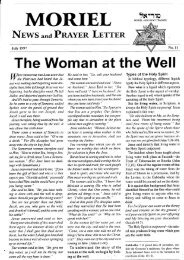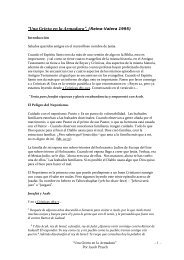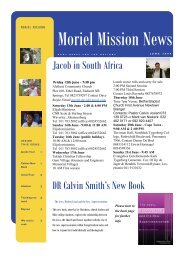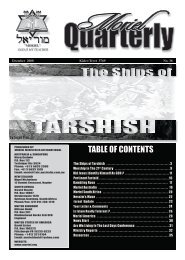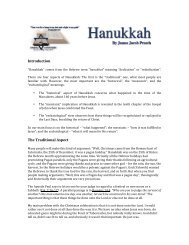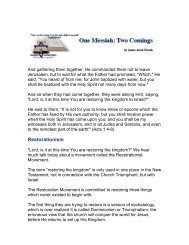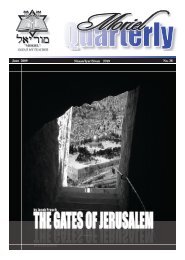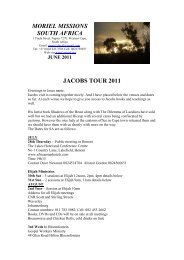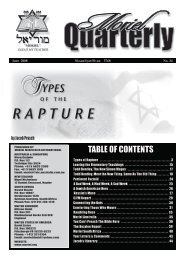Spiritual Warfare and Territorial Spirits (~5.5 MB) - Moriel Ministries
Spiritual Warfare and Territorial Spirits (~5.5 MB) - Moriel Ministries
Spiritual Warfare and Territorial Spirits (~5.5 MB) - Moriel Ministries
Create successful ePaper yourself
Turn your PDF publications into a flip-book with our unique Google optimized e-Paper software.
CommentaryCommentary by Roger Oakl<strong>and</strong>Roger Oakl<strong>and</strong>New <strong>Spiritual</strong> Disciplines FromAncient Roman Catholic SourcesC O M M E N T A R YPromoters of the emergent conversationsay we are on the vergeof an era that promises renewedspiritual awareness. “<strong>Spiritual</strong> disciplines”are being touted as theavenue to a “spiritual reformation”that will take Christianity to a new<strong>and</strong> higher level of spirituality drawingall participants closer to God.Books published by majorChristian publishers written by wellknown authors are plentiful on thistopic. For example, J.P. Morel<strong>and</strong><strong>and</strong> Klaus Issler are both professorsat Talbot School of Theology at BiolaUniversity in southern California.Morel<strong>and</strong> is professor of philosophy.Issler is professor of Christian education<strong>and</strong> theology. In 2006, Navpresspublished a book they co-authoredtitled The Lost Virtue of Happiness:Discovering the Disciplines of theGood Life. [1] On the back cover,the following statement is made:Authors J.P. Morel<strong>and</strong> <strong>and</strong> KlausIssler illustrate how we are happyonly when we pursue a transcendentpurpose – something larger than ourselves.This involves a deeply meaningfulrelationship with God througha selfless preoccupation with thespiritual disciplines. The Lost Virtueof Happiness takes a fresh look at thespiritual disciplines, offering concreteexamples of ways you can make thempractical <strong>and</strong> life transforming. [2]The title gives a good overviewof what the book is about. Morel<strong>and</strong><strong>and</strong> Issler believe they have rediscoveredimportant spiritual principlesthat have been lost. If youfollow these principles <strong>and</strong> they becomepart of your everyday Christianlife, you can be transformed.One of the spiritual disciplinesthe authors have recovered is outlinedin a chapter titled “GainingHappiness by Losing Your Life.”Under the subheading “Two Friends:Solitude <strong>and</strong> Silence” the authorsmake the following statement:The disciplines of solitude <strong>and</strong>silence are absolutely fundamentalto the Christian life, are naturally practicedin t<strong>and</strong>em. In solitude we chooseto be alone <strong>and</strong> to reflect on how we experiencethe facets of life (family, job,relationship with God, finances) <strong>and</strong>what they mean to us while in isolation.We unhook from companionship withothers; we take ourselves physically<strong>and</strong> mentally out of our social, familial,<strong>and</strong> other human relationships. [3]While it is true, getting away <strong>and</strong> alonesomewhere is often the best way to concentrate<strong>and</strong> evaluate life’s most importantdecisions, the isolation <strong>and</strong> solitude thatMorel<strong>and</strong> <strong>and</strong> Issler are promoting as aspiritual discipline in the name of Christianityhas some eastern mystical overtones.Further the authors attempt to add credibilityto this rediscovered “spiritual discipline”by quoting Roman Catholic mystic<strong>and</strong> priest, Henri Nouwen, who once said:The man or woman who has developedthis solitude of heart is no longerpulled apart by the most divergentstimuli of the surrounding world butis able to perceive <strong>and</strong> underst<strong>and</strong> thisworld from a quiet inner center. [4]This “quiet inner center” Nouwenwrote about is suspect, especially in lightof spiritual disciplines practiced by thoseinvolved in the Buddhist <strong>and</strong> Hindu faiths.Further, it seems that Nouwen’s RomanCatholic mystical beliefs <strong>and</strong> teachingshave strongly influenced the authors.Continuing to develop their idea of theimportance of rediscovering the lost art offinding the “quiet inner center,” they state:Go to a retreat center that has one ofits purposes the provision of a place forindividual sojourners. Try to find a centerthat has gardens, fountains, statues, <strong>and</strong>other forms of beautiful artwork. In ourexperience, Catholic retreat centers areusually ideal for solitude retreats… Wealso recommend that you bring photos ofyour loved ones <strong>and</strong> a picture of Jesus…Or gaze at a statue of Jesus. Or let somethought, feeling, or memory run throughyour mind over <strong>and</strong> over again. [5]I have searched the scriptures. Gazingat a picture or statue of Jesus or concentratingon a thought or feeling in order to establish“a quiet inner center” just isn’t there!God’s Word or Man’s wordIt is apparent to me after readingcountless books published by mainlinepublishers on the subject of the emergingchurch movement that there aretwo underlying common denominators.First, it is apparent that the “new kindof Christian” that is being groomed byemergent teachings is being conditionedto accept, embrace <strong>and</strong> promote a “newmysticism” under the banner of spiritualformation. However, the so-called spiritualdisciplines that are promoted as partof this spiritual formation are not new.They are the same methods <strong>and</strong> techniquesthat have seduced the masses sincethe fall of man in the Garden of Eden.Second, the teachings <strong>and</strong> beliefs ofRoman Catholic mystics who embracedeastern mysticism in the past are being reintroduced,<strong>and</strong> for many, are taking precedenceover the Word of God. The onslaughtof ideas promoted by these RomanCatholic mystics is staggering. Why is thisso? Is it possible many are being seduced<strong>and</strong> don’t realize what is happening? Whycan people not see the Roman Catholicconnection? Have they been blinded?For example, in a section of TheLost Virtue of Happiness: DiscoveringThe Disciplines of The Good Life,Morel<strong>and</strong> <strong>and</strong> Issler provide tips for“developing ongoing prayer.” Hereare some of the points they made:• We recommend that you beginby saying the Jesus Prayer aboutthree hundred times a day. [6]• When you first awaken, say the JesusPrayer twenty to thirty times. Asyou do, something will begin to happento you. God will begin to slowlyoccupy the center of your attention. [7]• Repetitive use of the Jesus Prayerwhile doing more focused things allowsGod to be on the boundaries of yourmind <strong>and</strong> forms the habit of being gentlyin contact with him all day long. [8]You don’t have to be Bible scholarto underst<strong>and</strong> that repetitive prayersdesigned to get one into a state of consciousnessin order to bring one clos-20 <strong>Moriel</strong> Quarterly • June 2007


